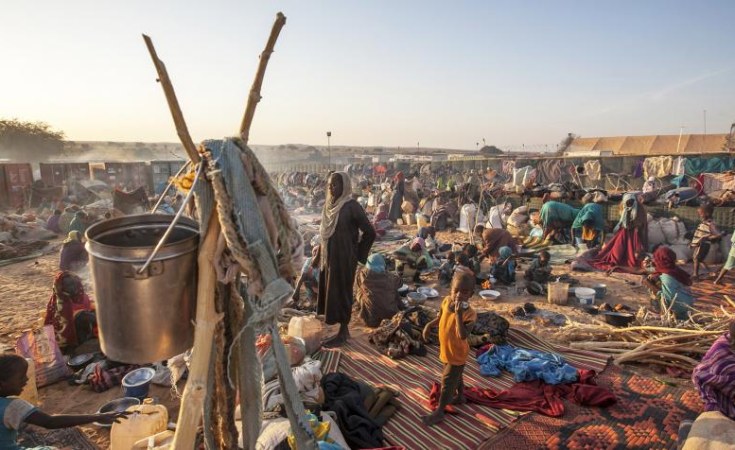Geneva — April marks the one-year anniversary of the war in Sudan, sparked by a power struggle between two rival generals. Aid organizations say the war is having catastrophic consequences for the population of nearly 49 million people -- more than half of whom need life-saving humanitarian assistance.
Since the conflict began April 15, 2023, tens of thousands of people have been killed and injured, millions have been forcibly uprooted from their homes and among the 18 million people suffering from acute hunger, 5 million are on the brink of famine, according to the World Food Program.
"And yet this catastrophic humanitarian situation in Sudan today hardly receives the international attention that it warrants," said Dr. Richard Brennan, the regional emergency director for the World Health Organization's regional office for the Eastern Mediterranean.
The Cairo-based Brennan, who went on his first mission to an emergency country early last week since assuming his post just over a month ago, noted that he has visited Sudan multiple times over the past 25 years and seen the country through many crises -- such as floods, displacement, conflict and political turmoil.
Nevertheless, Brennan said he was taken aback by "the devastation that decades of fragility, and nearly a year of brutal war, have wreaked on the country."
"In fact, I was just reading the report from my 2014 mission which described a desperate situation with over 6.1 million in need of humanitarian assistance.
"It is extraordinary to reflect that today over 24.8 million people are in need -- four times what we observed 10 years ago," he said, adding that the health needs are massive.
"We estimate that almost 14,000 have been killed and 28,000 injured; there are ongoing outbreaks of cholera, measles, dengue fever, and malaria; around 3.4 million children are acutely malnourished; and 70 percent of health facilities in conflict-affected areas are non-functional or only partially functional," he said.
Early last week, Jill Lawler, chief of field operations and emergency for UNICEF in Sudan, led a team of 12 UNICEF staff on a mission to Omdurman - in the greater Khartoum area. Omdurman is a region that has been under near-constant fire since the war broke out.
She described the intolerable conditions under which millions of children are forced to live and told journalists in Geneva Friday about the difficulties of providing medical care to children in need.
She said, "At Al Nau Hospital, one of the only hospitals in Khartoum with a functional and very crowded trauma ward, we met with two young people who had recent amputations -- two young lives changed forever -- and we learned from the hospital director that about 300 had limbs amputated in the hospital in just the past month alone."
She said Al Nau and other hospitals she and her team visited were overcrowded, with two or three patients having to share the same bed. She said medicine and equipment were in short supply, health care workers were overworked, exhausted, and that most "have not been paid regular salaries in months."
"During our visit, we learned that women and girls who had been raped in the first months of war are now delivering babies -- some of whom have been abandoned to the care of hospital staff, who have built a nursery near the delivery ward," she said.
UNICEF projects nearly 3.7 million children in Sudan will be acutely malnourished this year, including 730,000 who need lifesaving treatment. "The scale and magnitude of needs for children across the country are simply staggering," said Lawler, noting that Sudan is the world's largest displacement crisis, adding, "Some of the most vulnerable children are in the hardest-to-reach places."
The World Health Organization reports escalating fighting is preventing desperately needed humanitarian aid from reaching millions of people across the country.
"We are especially concerned about the situation in Darfur states, where no direct humanitarian access has been possible for several months, and only limited aid is reaching people in these areas," said Dr. Hanan Balkhy, WHO regional director for the Eastern Mediterranean Region, in a statement Friday.
Balkhy, who went on the mission to Sudan early last week with her colleague, Richard Brennan, said, "Most health facilities have been looted, damaged, or destroyed. In West Darfur, the local health system has essentially ground to a halt."
"We have consistently shown that when we are provided with sufficient access and resources, we achieve good health outcomes.
"During my meetings with the deputy prime minister and minister of health, I received reassurances that all efforts will be made to facilitate the scale up of the health response throughout Sudan," she said.
UNICEF is appealing to the warring parties to enable rapid, sustained, and unimpeded humanitarian access both across conflict lines within Sudan and across borders with Sudan's neighboring countries.
"Chad has provided a crucial lifeline to communities in Darfur, and access through its border remains absolutely critical, along with access through South Sudan," Lawler said, adding that providing a lifeline for millions of destitute people will require generous support from the international community.
"We need a massive mobilization of resources by the end of March so that humanitarian partners can get the supplies and capacity on the ground, in time, to limit the impending humanitarian catastrophe that we are seeing," she said.


